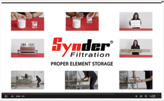Food & Beverage
Over the past 25 years, Synder Filtration has become a leading supplier of membrane filtration technology to companies throughout the food and beverage industry. We take pride in partnering and collaborating with our customers to forge new and innovative ways to create quality products and lower operating costs. Our line of elements has expanded throughout the years with a wide range of molecular weight cut-offs available for applications such as corn wet milling, juice processing, and gelatin concentration. We are committed to helping companies optimize their existing processes and take pride in fully understanding the needs of our customers in order to produce membranes and systems suitable for their separation needs.
Challenge
Corn Wet Milling
Many filtration steps are required in the wet milling of corn. Synder’s membranes, ranging from Micro to Nanofiltration, are capable of handling any of your application needs. From the removal of microorganisms to the concentration and clarification of corn syrup, Synder’s comprehensive line of membranes is ready to exceed your expectations.Gelatin Concentration
Concentration of suspended colloids is critical in the production of gelatin. Synder’s Ultra & Microfiltration membranes provide optimal retention rates for concentrating gelatin while removing unwanted microorganisms.Juice Processing
Ultra & Nanofiltration are widely used in the production of high quality juices. Synder Filtration’s line of Ultra and Nanofiltration membranes can remove starch, pectin, proteins, and polyphenolic compounds. Microfiltration can also be utilized for the removal of microorganisms.Natural Polymers & Xanthan Gum
Synder’s Micro and Ultrafiltration membranes are ideal for concentration of natural polymers. MF and UF filtration are required in the production of Xanthan gum. Synder’s MF and UF membranes provide an optimal combination of retention rates and throughput required for commercial production while removing harmful microorganisms.Dealcoholization
Traditional methods of manufacturing non-alcoholic beer require the worth to be processed in a way that doesn’t leave much room for imparting flavor. Instead of making a non-alcoholic beer why not remove the alcohol from regular beer, thus providing a non-alcoholic beer with much of the flavor of a regular draft. Synder’s NFX Nanofiltration membrane is capable of concentrating and removing alcohol efficiently with minimal effect to the flavor profile.Maple Syrup
Maple syrup production from maple sap is a time and energy consuming process that requires the sap to be reduced down to thick syrup. Conventional boiling reduction methods are tedious and use significant energy. Concentrating the sap using the NFX Nanofiltration membrane by Synder can reduce overall processing time and operating costs.Fragrance Recovery
Synder Filtrations NFX Nanofiltration membranes can be used to concentrate aroma compounds to manufacture natural & artificial fragrances. NFX captures and concentrates alcohols, aldehydes, amines, esters, ethers, ketones & terpenes.Solution
For the past thirty years, membrane filtration technology has been used throughout many stages of corn wet milling. As opposed to conventional methods such as centrifugation, membranes are able to save manufacturers in operational and discharge costs. Membrane filtration can also be used to clarify mud, the by-product of the conversion of starch to corn syrup, to produce a clear permeate stream ready for concentration. Common membranes used for this application include ST, BN, LY, LX, and FR.
Synder Filtration supplies elements with a wide spectrum of pore sizes to accommodate the process goals within the gelatin industry. Typically, microfiltration membranes are initially applied to remove fat and large suspended solids from the gelatin extract feed stream. Diafiltration is often applied as well to increase the total yield. Once the extract has undergone microfiltration, ultrafiltration is used to concentrate the gelatin, as an energy saving alternative to using a direct evaporator. Recommended membranes include FR, ST, MT MAX, NFW.
For juice processing, membrane filtration has become an attractive alternative, since the technology requires less energy and has minimum impact on the environment. It was found that after colloids, gums, proteins, starches, and color impurities were removed by microfiltration or ultrafiltration processes, the permeate could be sent directly to nanofiltration spiral-wound elements to concentrate sugar and desalinate the permeate if needed. Common membranes include NFX and NFW.
Lastly, Xanthan gum is an important microbial polysaccharide widely used throughout the food, agricultural, and oil industries as a thickening, stabilizing, and suspending agent. By concentrating thexanthan fermentation broth from 2.5% to 15% (w/v), up to 80% of the energy can be saved in recovering xanthan gum by using ultrafiltration to concentrate the broth prior to alcohol precipitation Due to the shear-thinning property of xanthan polymer, ultrafiltration at high pumping rates is required, and Synder’s MAX elements such as LX (MAX), can also be implemented for conditions requiring high temperature and extreme pH.
Case Study
Maple Syrup Concentration
Specsheets
NFW (TFC 300-500Da) Sanitary Specsheet
MT MAX (PES 5kDa) Sanitary Specsheet
ST (PES 10kDa) Sanitary Specsheet
BN (PVDF 50kDa) Sanitary Specsheet
LY (PES 100kDa) Sanitary Specsheet
LX (PES 300kDa) Sanitary Specsheet
LX MAX (PES 300kDa) Sanitary Specsheet
FR (PVDF 800kDa) Sanitary Specsheet
V0.1 (PVDF 0.1um) Sanitary Specsheet
Resources
Synder also offers a comprehensive application development program including feasibility testing for newer specialty process applications. Please contact us for more information. You will receive a personal response from one of our experienced team members within 24 hours.
Applications
CASE STUDY
questions? Fill out this form. We’ll contact you within 24 hours!
Resources
MEMBRANE RESOURCES
- Definition of a Membrane
- Membrane Materials: Organic vs. Inorganic
- Pressure-Driven Membrane Filtration Processes
- Concentration Polarization in Pressure-Driven Processes
- Degrees of Membrane Separation
- Flux Behavior in Membrane Processes
Module Configurations & Processes
-> View all membrane resourcesTUTORIALS









